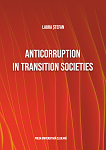| SUMMARY: |
Corruption is an ancient phenomenon that comes in many shapes and forms from petty corruption encountered in the everyday experiences of people with police, health or education, to systemic corruption that is engrained in the functioning of public systems, and to political corruption. In the Program of Action against Corruption the Council of Ministers of the Council of Europe acknowledges that “no precise definition of corruption can be found which applies to all forms, types and degrees of corruption, or which would be accepted universally as covering all acts, which are considered in every jurisdiction as constituting corruption” (Committee of Ministers of the Council of Europe, 1995, p. 14). A wide definition of the concept of corruption has been provided by the World Bank in 1997 “the abuse of public office for private gain” (World Bank, 1997, p. 8). Transparency International defines corruption as “the abuse of entrusted power for private gain” covering also corruption in the private sector and through its work attempts to unveil the links between the existence of corruption and democratic erosion and stagnation in economic development. This definition has been challenged by scholars by bringing into the theoretical debate the distinction between legal and illegal corruption, where legal corruption is “arising when the elite prefers to hide corruption from the population” or “investments in legal barriers” (Kaufmann, Vincente, 2005, p. 4). |
|
